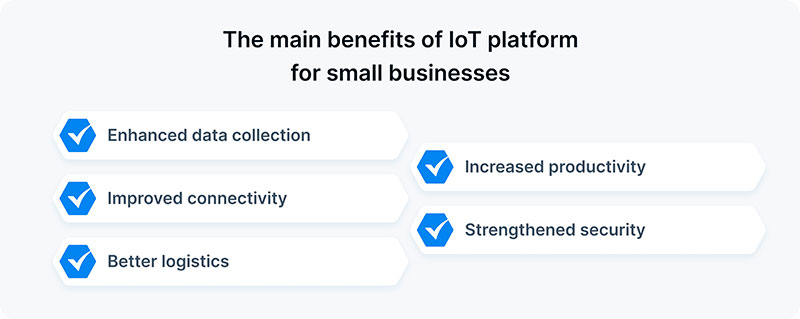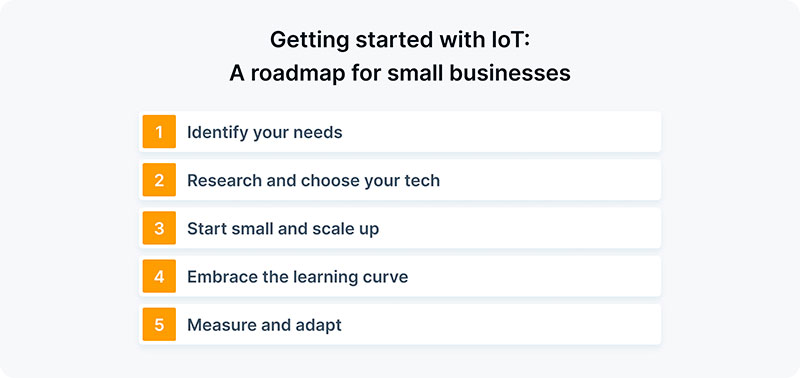Unlocking the Benefits of IoT for Small Businesses
January 10, 2024Introduction
In today's dynamic business landscape, small firms face relentless pressure to compete, optimize, and innovate. While giants grapple with economies of scale, the success of agile players hinges on their ability to capitalize on every advantage. Yet, many overlook a potent tool quietly reshaping the business landscape: the Internet of Things (IoT).
It's about connecting everyday devices, from inventory sensors to energy meters, to generate real-time data and automate vital processes. This data becomes the fuel for a new era of efficiency, insight, and agility – benefits no longer reserved for corporate giants.
In this article, we'll discuss the five real benefits of IoT for small businesses. You can also learn how smart technology can help you maintain a competitive edge and achieve long-term growth. The main benefits of IoT platform for small businesses.

Data collection using IoT platform
The introduction of IoT technology opens up significant opportunities for efficient data collection and tracking, whether for business or for something else. It allows you to control and optimize internal data processing, increasing overall operational efficiency.
The IoT platform uses sensors to monitor the condition of physical objects. For instance, in the food industry, smart sensors can be integrated into refrigerators to monitor and regulate temperature, providing real-time alerts for any deviations.
Increased productivity
Implementing automation software and communication tools for tasks such as record-keeping, documentation, and logistics management can streamline your employees' duties, allowing them to turn their attention to other priorities. This reduces the need for labor, which directly affects your labor costs.
Improved connectivity
Improved connectivity broadens the horizons for small businesses by offering more opportunities. The use of analytics, artificial intelligence, social media, video communication software, and similar tools enhances your business potential by opening up new opportunities and facilitating important processes such as competitive analysis.
Enhanced logistics
Every business owner needs to have a complete view of their organization, including inventory levels, resource allocation, working conditions, departmental statistics, and more.
Managing both internal aspects and external factors, such as regulations, laws, and industry guidelines, becomes increasingly difficult as your business grows. Using an IoT platform makes it easier to centralize data by streamlining its flow. Innovations like inventory and order management software, along with product sensors, tracking systems, and automation, contribute to efficient fleet management.
Strengthened security
The extensive network of data created by the Internet of Things exposes your information to various potential threats, creating numerous cyber vulnerabilities for your small business. With improved logistics and workplace management, you can ensure that facilities are properly maintained, thereby minimizing safety risks for employees. In addition, the use of IoT security solutions allows you to automate security policies and eliminate system vulnerabilities.
Getting started with IoT: A roadmap for small businesses
Embracing the power of IoT for your small business doesn't require a giant leap. Take it one smart step at a time, focusing on areas with the most immediate impact. Here's a practical roadmap to get you started.

- Identify your needs.
Don't get lost in the sea of possibilities. Start by pinpointing a specific business challenge you'd like to address, like inefficient inventory management or inconsistent energy use.
- Research and choose your tech.
Explore platforms like Kaa IoT on our dedicated webpage, where you'll find a comprehensive comparison of IoT platforms. In short, Kaa offers pre-built templates and user-friendly interfaces, simplifying the process of connecting your devices and analyzing data without requiring extensive coding expertise.
- Start small and scale up.
Begin with a pilot project focusing on a single department or process. This minimizes upfront investment and allows you to test the benefits and refine your approach before expanding.
- Embrace the learning curve.
Don't be afraid to experiment and learn. Kaa provides extensive resources and a supportive community to help you navigate the initial learning curve. Remember, successful IoT implementation is an ongoing journey.
- Measure and adapt.
Track the impact of your IoT solution on key metrics like productivity, cost savings, or customer satisfaction. Use this data to continuously refine your approach and maximize the benefits of your investment.
By following these steps and leveraging platforms like Kaa, you can unlock the power of IoT without getting overwhelmed. Remember, even small changes, powered by smart data, can significantly enhance your operational efficiency, customer experience, and ultimately, your bottom line.
Summary
This article explored the transformative potential of the Internet of Things (IoT) for small businesses in today's competitive landscape. We delved into five key benefits of IoT for small businesses, from data-driven insights and enhanced productivity to strengthened security and optimized logistics.
By embracing a smart approach, starting small, and scaling thoughtfully, even the most agile small businesses can leverage IoT to gain a significant edge. Ultimately, integrating smart technology into your operations is not just about efficiency gains; it's about unlocking new possibilities for growth, innovation, and customer satisfaction. Remember, even small steps powered by data can propel your business to new heights.
